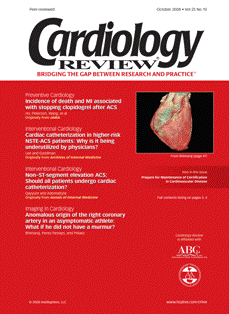Western medicine and Eastern practices: Insights from the First World Congress on Clinical, Preventive, and Geriatric Cardiology
The First World Congress on Clinical, Preventive, and Geriatric Cardiology (WCCPGC) took place from September 19 to 21 near New Delhi, India, at the Om Shanti Retreat Center in Gurgaon. This center is a spiritual oasis of the Brahma Kumaris, who practice Raja yoga meditation as a means of integrating their spiritual identity with social and physical realities to achieve a healthy balance between their inner and outer worlds. During the Congress, the spiritual ambience of this oasis converged perfectly with cardiovascular science, paying tribute to the ancient wisdom of using both science and spirituality to manage cardiovascular ailments.
Drs H.K. Chopra, Satish Parashar, and Navin C. Nanda presided over the meeting, at which many other AACIO members were present. Approximately 1400 delegates and 25 international faculty members attended, including cardiologists from the United States, Bangladesh, Sri Lanka, and Nepal. His Excellency, Dr Abdul Kalam Azad, the former President of India, inaugurated the WCCPGC and presented data from the “Healthy and Happy Lifestyle Program for Coronary Artery Disease (CAD) Regression.” This study, which was organized by the Global Hospital Research Center, Mount Abu, India, and the Defense Research and Development Organization, New Delhi, India, has shown profound benefits with proper diet, exercise, practice of spirituality, and Raja yoga meditation on cardiovascular health.
During the WCCPGC, stalwarts in cardiology from India and abroad undertook brainstorming sessions to create guidelines for preventive strategies and programs to eradicate myocardial infarction (MI). Many scientific sessions were held, covering everything from metabolic syndrome to absolute ethyl alcohol ablation for hypertrophic cardiomyopathy. Dr Nanda, who served as the International President of the Congress, made a plea to attendees to practice medicine combining Western techniques and its technological advances, with Eastern techniques practiced in India and China, such as Raja yoga. He emphasized the importance of treating patients as whole beings and not just focusing on their ailing body parts. He also pointed out that all the risk factors in a given patient should be adequately treated as the risk multiplies severalfold when more than 1 risk factor is present.
Several awards were given during the event by His Excellency, Dr Azad, and Dr Nanda received 2 of these: the “Father of Echocardiography,” for his tremendous contribution in developing and teaching echocardiography, and a “Lifetime Achievement Award,” for his contribution to the field of cardiology. Over the years, Dr Nanda has provided many important insights on how cardiovascular diseases uniquely affect Asian Indians. He uncovered an increased prevalence of MI in young adults in India and was one of the first to recognize a relationship between diabetes mellitus and MI. This pioneering work was done when he was still a medical resident in India and was praised as the “first thorough study” of an Asiatic population in an editorial in the New England Journal of Medicine.1,2 In the 1990s, Dr Nanda was an investigator in a study that examined increased platelet activation and fibrinogen in Asian Indians; the study taught us that this population has many nontraditional risk factors.3 Another study in which he participated found an increased prevalence of smaller and denser low-density lipoprotein particles in Asian Indians living in the United States, increasing our understanding of CAD in this particular group of immigrants.4 In 2004, Dr Nanda was involved in the first survey of Asian Indians in the United States, which found a high prevalence of stroke, diabetes, and associated risk factors in this population.5,6
Overall, the WCCPGC was a success. Forty participants petitioned Drs Nanda and Chopra to form an international alliance for prevention of cardiovascular diseases in India and South Asia. Attendees also had the opportunity to meet with the current President of India, Her Excellency, Pratibha Patil. While entertaining selected faculty at the Presidential Palace, she promised to implement the preventive measures for cardiovascular disease that were outlined at the WCCPGC.
